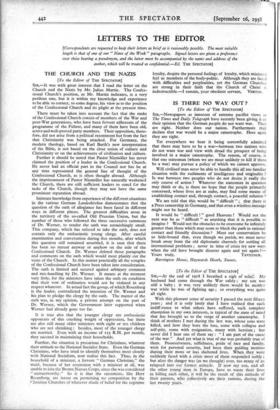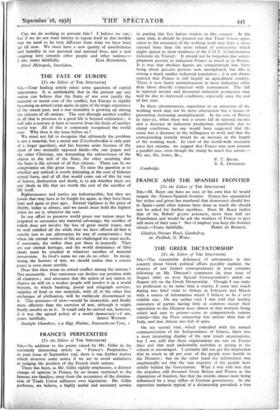[To the Editor of THE SPECTATOR]
Snt,—At the end of 1918 I breathed a sigh of -relief. My husband had come through the War safely ; my, son, was still a baby ; it was very unlikely there , would be another war while he was of fighting age ; so everything was quite all right.
With this pleasant sense of security I passed the next fifteen. years ; . and it is only lately that I have realised that such indifference to what others have suffered, such complete absorption in my own interests, is typical of the.state of mind that has brought us to the verge of another catastrophe.. I think of mothers I met during the last war, whose sons were killed, and how they bore the loss, some with collapse and self-pity, some with resignation, many with heroism ; . but never did I hear one of them say : "I am part of the cause of the war." And yet what is true of me was probably true of them. Possessiveness, selfishness, pride of race and family, wish for personal security, had been their guiding motives during their more or less sheltered lives. When they were suddenly faced with a crisis most of them responded nobly ; but after the danger *as (-as we thought). over, Mo many of us relapsed into our former attitude. If now my son, and all the other young men in Europe, have to waste their lives in killing each other, it will be the result of this attitude of
their parents, who collectively are their nations, during the . , . . . last twenty years. Can We do nothing to prevent this ? I believe we can ; but if we do not want history to. repeat itself in this terrible way we need to be very different from what we have been up till now. We must have a new quality of waselfisluie,ss and humility in our personal and national lives, and a new outgoing love towards other people and other nations.— I am, yours faithfully, ELSA RICHMOND.
Hotel Metropole, Interlaken. '











































 Previous page
Previous page